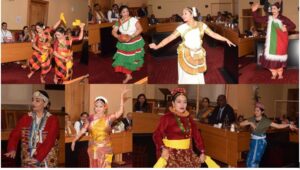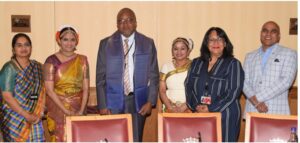Deputy High Commissioner of Kenya High Commission Ambassador Joakim K Kamere, DCM/Counsellor Mrs Roshan Khanal, Embassy of Nepal, and speakers Dr. Phil. Sahidi Bilan, Cllr. Sharad Kumar Jha and Chanukya Rajagopala have all shared key perspectives and inputs at the World Day for Cultural Diversity at the House of Lords of the British Parliament recently. The important United Nations observance has been organised by Sanskruti Centre for Cultural Excellence, their third time since 2018. Diplomats from the High Commissions of the Maldives and Sri Lanka Ms Fathika Fayaz and Ms Thivanka Athuraliya were in attendance representing their missions and community members from different parts of the UK and from Germany have come to attend this interesting programme.

In her opening speech, parliamentary host Baroness Sandip Verma, who is a former Under Secretary of International Development underscored the significance of understanding the diversity and stressed the role of women in conserving and preserving the cultural heritage.
Complimenting the context and the discussion, a rich variety of dances from different regions have been presented, demonstrating the positive role of performing arts on mutual respect, cooperation, and development. Classical dances Mohiniattam and Bharatanatyam, rarely seen Garo dance of Meghalaya, Miji dance of Arunachal Pradesh, Siddi dance of people of African origin in India & Hejje Kunita of Karnataka, Shondol dance of Ladakh, and the oldest Nepalese dance Maruni have all enhanced the cultural awareness of attendees and made history for having been presented at such a key venue for the very first time.

Radhika Joshi, and Sushil Rapatwar have introduced the speakers and dances, and the dances were presented by Deepa Khanal, Harsha Srinivas, Lumbini Bafna, Manju Sunil, Preetha Chandran Sakunthala, Shouri Kokkonda, Sindhu Narasimaiah, Swarnalatha Pasupuleti and Ragasudha Vinjamuri.
Sanskruti Centre has been lauded for the unique initiative as such events are key to facilitating the exchange of ideas, information, art, language and other aspects of culture among nations and their peoples.

Readers like you, make ESHADOOT work possible. We need your support to deliver quality and positive news about India and Indian diaspora - and to keep it open for everyone. Your support is essential to continue our efforts. Every contribution, however big or small, is so valuable for our future.











